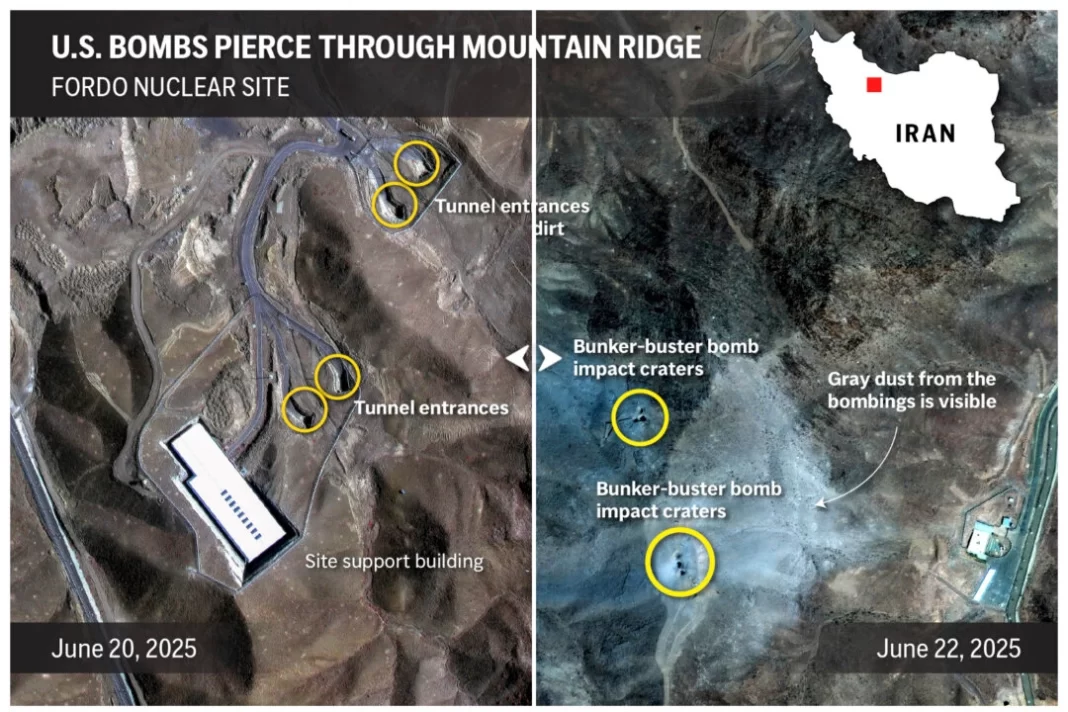Estimated reading time: 4 minutes
EEUU. President Donald Trump said he would not allow Iran to restart its nuclear program after Tehran suspended cooperation with international nuclear inspectors.
Speaking to reporters on July 4 aboard Air Force One, the president said last month’s airstrikes on Iran’s three uranium enrichment sites were a “great success” that he believes has permanently crippled the country’s nuclear capabilities. He did acknowledge, however, that the program could in theory be restarted elsewhere.
“The whole nuclear thing, I would say, is set back permanently,” Trump said as he traveled to New Jersey after an Independence Day celebration at the White House. ”If they were to do it again, they might as well start in a different location, because that location is totally demolished.”
“They could start, but I would think they’d have to start in a different location,” he continued. “But if they did start, there’d be a problem. We wouldn’t allow that to happen.”
Trump also said he planned to discuss the matter with Israeli Prime Minister Benjamin Netanyahu at the White House on July 7.
When asked about Iran’s refusal to allow inspections of its nuclear program or to cease uranium enrichment, Trump said he would wait to see what Iranian leaders have to say if they seek a future meeting with him.
“They want to meet with me,” he said. “So, if they haven’t agreed, then we’re not going to have a very successful meeting.”
Nuclear Inspections Blocked Following Strikes
Trump’s comments come as Iran formally suspended its cooperation with the International Atomic Energy Agency (IAEA) following airstrikes by both Israel and the United States targeting key nuclear infrastructure.
Israel has said its June 13 military strikes targeted Iran’s top military leadership, nuclear scientists, uranium enrichment sites, and ballistic missile program in a preemptive effort to block the Islamic Republic from pursuing its stated goal of destroying Israel.
On June 22, the United States launched strikes of its own on Iranian nuclear facilities at Fordow, Isfahan, and Natanz.
Among these, the Fordow fuel enrichment plant, buried deep inside a mountain, was considered Iran’s most heavily fortified nuclear site. The Pentagon said it deployed B-2 “Spirit” stealth bombers to drop 30,000-pound bunker-busting bombs through ventilation shafts, and detonated in carefully timed sequences to collapse the underground complex.
On June 25, a day after a cease-fire between Israel and Iran took effect, Iranian lawmakers overwhelmingly voted in favor of a bill to halt collaboration with the IAEA until the safety of Iran’s nuclear sites could be guaranteed. The bill was subsequently approved by the Guardian Council, the body responsible for vetting legislation, and then signed into law by the Iranian presidency.
The IAEA confirmed on July 4 that it has pulled its last remaining inspectors out of Iran amid the worsening standoff over access to the bombed nuclear facilities. Since the strikes, IAEA inspectors have been barred from visiting those sites, even though IAEA Director General Rafael Grossi has made it his agency’s top priority.
“An IAEA team of inspectors today safely departed from Iran to return to the Agency headquarters in Vienna, after staying in Tehran throughout the recent military conflict,” the agency said on social media platform X.
Uncertainty Over Enriched Uranium Stockpile
For decades, Iran has been subject to intensive inspections of its nuclear facilities, with IAEA officials visiting its enrichment sites every couple of days and checking its stockpile of enriched uranium to make sure no fissile material was being diverted to produce weapons. Iran has claimed that its nuclear program is solely for peaceful purposes.
In a June 22 report to the United Nations Security Council, the IAEA said that Iran had accumulated over 400 kilograms of uranium enriched to 60 percent purity, a short step to the 90 percent threshold needed to make a nuclear weapon. The agency said it remains unclear what happened to that stockpile following the bombings.
“It is essential that the Agency resumes inspections as soon as possible to provide credible assurances that none of [the enriched uranium stockpile] has been diverted,” Grossi told the Security Council.
Theepochtimes.com





































